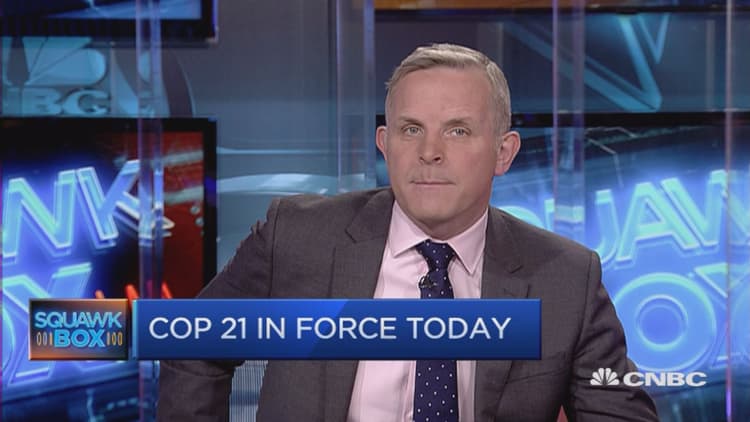
For many, November 4th will go down as an important day in the battle to save the planet and we need to go back to 2015 to understand why.
At last year's COP21 summit in Paris, after days of painstaking and fraught negotiations, world leaders agreed to make sure global warming stayed "well below" 2 degrees Celsius and to "pursue efforts" to limit the temperature rise to 1.5 degrees.
Today, that agreement comes into force.
"It's an historic day for so many reasons," Erik Solheim, head of UN Environment (UNEP), said in a recorded statement released in the hours before the agreement passed. "It shows the shift to a greener world is irreversible," he added. "It shows we're able to set aside differences to tackle common problems with consensus. It shows the world is swayed by good science and solid evidence."
On Friday, the International Energy Agency (IEA) stated that the agreement's ratification and coming into force showed that the world was "finally committing to tackling climate change" while WWF International's Manuel Pulgar-Vidal – who leads the body on climate change – wrote in a blogpost that the agreement had created "a unique framework for partnership among governments, businesses, civil society, faith groups and communities to collaborate and rally behind this crucial common cause for the planet."
Today's news is seen as a boon for environmental organisations and climate change activists, but a great amount of work still needs to be done.
On Thursday, UNEP released a new report which pointed to temperature rise of up to 3.4 degrees centigrade this century, even with the commitments made at Paris. Emissions were expected to hit between 54 to 56 gigatonnes of CO2 equivalent by 2030, UNEP added. If this scenario plays out, then the planet's temperature would be on course to rise by 2.9 to 3.4 degrees centigrade this century, UNEP said.
"We are moving in the right direction," Solheim said in news release. "The Paris Agreement will slow climate change, as will the recent Kigali Amendment to reduce HFCs," he added, referencing a recent agreement to cut the use of hydrofluorocarbons. "They both show strong commitment, but it's still not good enough if we are to stand a chance of avoiding serious climate change."
World leaders will have an opportunity to maintain momentum on climate change when they gather in Morocco for the COP22 climate summit next week. If additional action was not agreed upon, then an "avoidable human tragedy" would take place, Solheim said.
"The growing numbers of climate refugees hit by hunger, poverty, illness and conflict will be a constant reminder of our failure to deliver," he added. "The science shows that we need to move much faster."
The IEA's executive director, Fatih Birol, also cautioned about the momentous challenge. "Let's not underestimate the task ahead," he said on Friday.
"Limiting carbon emissions and changing our energy systems is a monumental challenge. But the IEA is working with governments around the world to help identify solutions and show how it can be done."




